“Global AI as a Service Market to reach a market value of USD 116.7 Billion by 2030 growing at a CAGR of 41.4%”
The Global AI as a Service Market size is expected to reach $116.7 billion by 2030, rising at a market growth of 41.4% CAGR during the forecast period.
The need for AIaaS in the medical industry is fueled by several issues, including the need to handle data more efficiently and optimize healthcare costs, expanding public-private partnerships, and rising regional healthcare spending. Thus, the healthcare & life sciences segment acquired $866.8 million in 2022. By analyzing vast quantities of chemical and biological data, AIaaS is being utilized to escalate drug discovery as well as the development process. AI algorithms can identify potential drug candidates, predict their efficacy and safety profiles, and optimize clinical trial designs, leading to faster and more cost-effective drug development.
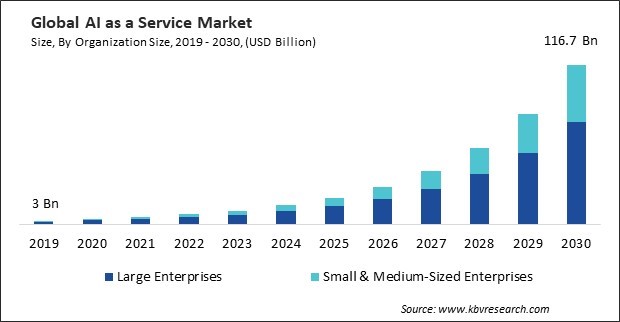
The major strategies followed by the market participants are Partnerships as the key developmental strategy to keep pace with the changing demands of end users. For instance, In January, 2024, IBM Corporation has collaborated with SAP SE. The collaboration aims to enhance supply chain, finance operations, sales, and services. The focus is on assisting CPG companies, wholesalers, and retailers in efficiently managing assortments, improving product distribution, and driving incremental revenue. This will be achieved through transportation planning enhancement, optimization of store-level assortments, and the automation of order settlement processes. Additionally, In December 2023, IBM Corporation has entered into an agreement with Software AG to acquire StreamSets, WebMethods, and iPaaS (integration ) enterprise technology platforms. This acquisition underscores IBM's strong commitment and investment in AI and hybrid cloud.
Based on the Analysis presented in the KBV Cardinal matrix; Microsoft Corporation and Google LLC are the forerunners in the AI as a Service Market. In June, 2023, Microsoft Corporation formed a multi-year partnership with MicroStrategy Incorporated, an analytics and business intelligence company. Under the multi-year partnership, the advanced analytics abilities of MicroStrategy were combined with the Azure OpenAI Service of Microsoft. Additionally, the partnership increased the availability of the products of MicroStrategy through Microsoft Azure. Companies such as Oracle Corporation, IBM Corporation and Baidu, Inc. are some of the key innovators in AI as a Service Market.
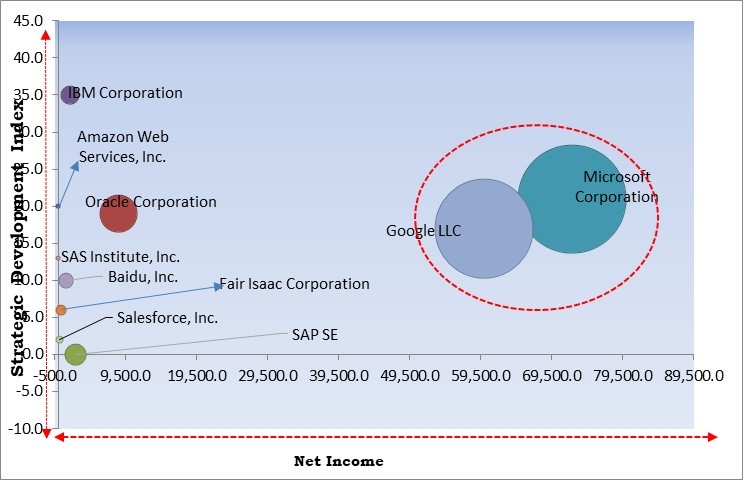
Recently, businesses across industries have started recognizing the transformative potential of AI in driving innovation, enhancing operational efficiency, and delivering superior customer experiences, the demand for AIaaS has surged. This demand is fueling the expansion and evolution of the market, creating a robust ecosystem of AI service providers and innovative solutions. The proliferation of AIaaS providers has resulted from the increasing demand for AI-driven capabilities; these companies offer various services to meet the varying requirements of industries. This expansion has made AIaaS more accessible to businesses of all sizes, from startups to large enterprises, democratizing access to advanced AI technologies previously out of reach for many organizations. Therefore, as businesses continue to embrace AI as a strategic imperative, the market is expected to evolve and mature further, offering even more advanced and specialized AI services to meet the diverse needs of businesses across industries and regions.
The scalable and adaptable infrastructure provided by cloud computing providers is ideal for hosting AI services. This meets the needs of organizations that wish to adopt AIaaS without making substantial initial investments in devices or software. These computing platforms provide enterprises with scalable resources, enabling them to adjust their capacity in accordance with the demands of their AI workload. This scalability is essential for AI applications, which often require significant computational resources for tasks such as training complex machine learning models or processing large volumes of data. By leveraging the scalability of cloud infrastructure, businesses can efficiently manage their AI workloads without the need for large upfront investments in hardware or infrastructure. As a result, businesses can now experiment with AI, deploy AI-powered applications, and scale their AI initiatives more affordably, driving broader adoption of AIaaS across diverse industry sectors. Thus, all of these aforementioned factors are aiding in the market's growth.
Many organizations operate with legacy systems not designed to accommodate AI capabilities, making seamlessly integrating AIaaS solutions into their workflows challenging. This lack of interoperability can lead to data silos, where valuable information is trapped in isolated systems, hindering the ability to harness the full potential of AI across the enterprise. Another challenge is the complexity of integrating AIaaS solutions with existing software and hardware. This complexity arises from ensuring that AI models communicate effectively with different systems, databases, and applications while maintaining data integrity and security. Achieving this level of integration often requires significant customization and development efforts, which can be time-consuming and costly, especially for large enterprises with complex IT ecosystems. However, if AIaaS solutions are not seamlessly integrated with existing systems, scaling them up to meet growing demands can be difficult and require substantial reengineering efforts. Therefore, the interoperability and integration challenges may hamper the market's growth.
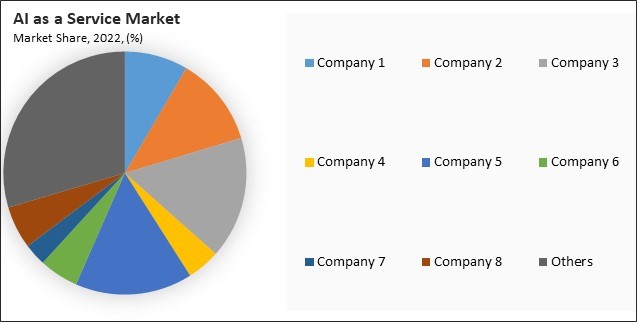
The leading players in the market are competing with diverse innovative offerings to remain competitive in the market. The above illustration shows the percentage of revenue shared by some of the leading companies in the market. The leading players of the market are adopting various strategies in order to cater demand coming from the different industries. The key developmental strategies in the market are Partnerships, Collaborations & Agreements.
By organization size, the market is divided into small & medium-sized enterprises and large enterprises. The large enterprises segment witnessed the maximum revenue share in the market in 2022. AIaaS allows large enterprises to accelerate the development and deployment of AI applications. By leveraging pre-built AI models, APIs, and development tools offered by AIaaS providers, enterprises can reduce the time and effort required to build and deploy AI solutions, allowing them to bring new AI-powered products and services to market faster. Large enterprises can benefit from the pay-as-you-go model of AIaaS, which allows them to pay only for the AI services and resources they use, avoiding upfront capital expenditures and reducing total cost of ownership (TCO) for AI initiatives.
Based on offering, the market is segmented into infrastructure as a service, platform as a service, and software as a service. The platform as a service segment acquired a substantial revenue share in the market in 2022. In order to facilitate multi-tenancy, PaaS offerings enable concurrent utilization of shared infrastructure and resources by multiple users. This multi-tenancy enables organizations to optimize resource utilization and reduce costs while supporting multiple AI applications and users. Businesses are now looking to AI Platforms as a Service (AIPaaS) to address their cloud issues by reducing cloud waste, lowering expenses, and streamlining operations.
On the basis of cloud type, the market is classified into public cloud, hybrid cloud, and private cloud. The public cloud segment acquired the largest revenue share in the market in 2022. Public clouds offer scalable and flexible computing resources, allowing businesses to scale their AI initiatives easily based on demand. Pay-as-you-go public cloud providers often allow businesses to pay just for the services they utilize. Additionally, having a worldwide presence, public cloud providers offer high availability to businesses worldwide.
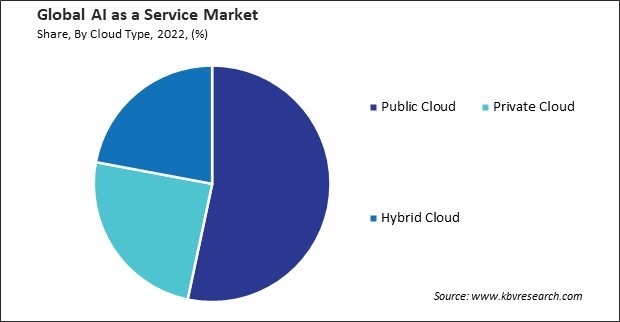
Based on technology, the market is characterized into machine learning, natural language processing, context awareness, and computer vision. The computer vision segment procured a considerable growth rate in the market in 2022. The demand for computer vision technology is driven by its ability to automate tasks, enhance user experiences, improve healthcare outcomes, enable autonomous vehicles, enhance security and surveillance, and optimize industrial processes. By utilizing cloud-based computer vision platforms, businesses may effortlessly upload, analyze, and train models to perform difficult tasks like object detection, picture recognition, and video analysis.
On the basis of vertical, the market is classified into BFSI, retail & eCommerce, healthcare & life sciences, IT & telecom, government & defense, manufacturing, energy & utilities, and others. The IT and telecom segment witnessed a considerable growth rate in the market in 2022. The IT and telecom segment is one of the largest AI tools and technologies consumers, contributing to its growth. This is because it improves productivity and makes handling complex software development projects easier. AIaaS can automate IT operations, such as IT service management, infrastructure provisioning, and application deployment. AI-powered automation can streamline IT workflows, reduce manual errors, and improve operational efficiency, allowing IT and telecom companies to focus on strategic initiatives.
Free Valuable Insights: Global AI as a Service Market size to reach USD 116.7 Billion by 2030
Region-wise, the market is analyzed across North America, Europe, Asia Pacific, and LAMEA. The North America segment acquired the maximum revenue share in the market in 2022. North America is at the forefront of technological innovation, with a robust ecosystem of technology companies, research institutions, and startups driving AI and cloud computing advancements. This ecosystem fosters a culture of innovation and entrepreneurship, leading to the development of cutting-edge AIaaS solutions and platforms. This region is home to several well-known AI businesses making significant investments in the field of study and development. As a result, new AI applications and technologies have been created, significantly boosting the market for AI as a service.
| Report Attribute | Details |
|---|---|
| Market size value in 2022 | USD 7.6 Billion |
| Market size forecast in 2030 | USD 116.7 Billion |
| Base Year | 2022 |
| Historical Period | 2019 to 2021 |
| Forecast Period | 2023 to 2030 |
| Revenue Growth Rate | CAGR of 41.4% from 2023 to 2030 |
| Number of Pages | 383 |
| Number of Tables | 583 |
| Report coverage | Market Trends, Revenue Estimation and Forecast, Segmentation Analysis, Regional and Country Breakdown, Competitive Landscape, Market Share Analysis, Porter’s 5 Forces Analysis, Company Profiling, Companies Strategic Developments, SWOT Analysis, Winning Imperatives |
| Segments covered | Offering, Cloud Type, Technology, Organization Size, Vertical, Region |
| Country scope |
|
| Companies Included | IBM Corporation, Microsoft Corporation, Amazon Web Services, Inc. (Amazon.com, Inc.), Oracle Corporation, Google LLC (Alphabet Inc.), Fair Isaac Corporation (FICO), Baidu, Inc., SAS Institute, Inc., SAP SE, Salesforce, Inc. |
By Organization Size
By Offering
By Cloud Type
By Technology
By Vertical
By Geography
This Market size is expected to reach $116.7 billion by 2030.
Growing demand for AI solutions are driving the Market in coming years, however, Significant interoperability and integration challenges restraints the growth of the Market.
IBM Corporation, Microsoft Corporation, Amazon Web Services, Inc. (Amazon.com, Inc.), Oracle Corporation, Google LLC (Alphabet Inc.), Fair Isaac Corporation (FICO), Baidu, Inc., SAS Institute, Inc., SAP SE, Salesforce, Inc.
The expected CAGR of this Market is 41.4% from 2023 to 2030.
The Infrastructure as a Service segment is generating the highest revenue in the Market by Offering in 2022; there by, achieving a market value of $51.2 billion by 2030.
The North America region dominated the Market by Region in 2022, and would continue to be a dominant market till 2030; there by, achieving a market value of $43.8 billion by 2030.
Our team of dedicated experts can provide you with attractive expansion opportunities for your business.
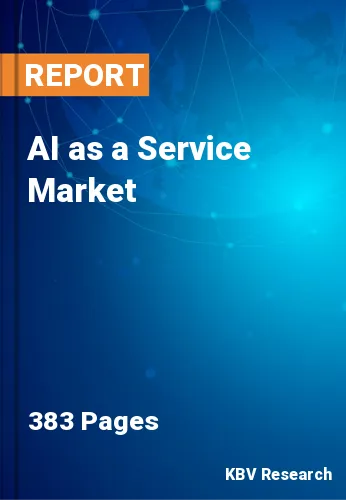
 Drivers
Drivers
 Restraints
Restraints
 Opportunities
Opportunities
 Challenges
Challenges
